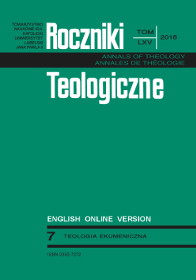Was Arminius a Reformed Theologian? On Arminius’ Attitude to His Own Theological Tradition
Was Arminius a Reformed Theologian? On Arminius’ Attitude to His Own Theological Tradition
Author(s): Damian DorockiSubject(s): Christian Theology and Religion, Theology and Religion, Systematic Theology
Published by: Towarzystwo Naukowe KUL & Katolicki Uniwersytet Lubelski Jana Pawła II
Keywords: Jacob Arminius; Reformed theology; God’s sovereignty and glory; covenant theology; soteriology; predestination
Summary/Abstract: Jacob Arminius is a figure historically associated with the Reformed tradition. His theology was in a large measure a reflection of this tradition. However, in some important points Arminius’ views were in open contradiction to post-Reformation Calvinism. This article is an attempt to find an answer to the question about the theological identity of the Dutch reformer. The author proposes to address this problem in reference to four theological themes characteristic of Reformed Protestantism, that is: God’s sovereignty and glory, covenant theology, monergistic soteriology, and predestination. The analysis indicates that Leiden’s professor strongly emphasized God’s sovereignty over creation and affirmed that the ultimate end of divine actions, including salvific acts, is His glory. But he never forgot to add that, by His external activity, the Creator communicates His goodness. Arminian covenant theology also fits into Reformed thought. Its shape does not differ from the widely accepted interpretation of this issue in the era of “early orthodoxy.” The most important differences occur in the context of soteriology. Arminius’ understanding of the relationship between grace and free will differed from the radical monergistic Calvinism. Due to the doctrine of prevenient grace, one can speak about limited synergism in his case. His perspective on the issue of predestination is the same. According to the Dutch reformer, God elects to salvation on the basis of His foreknowledge concerning the free acceptance of grace by man. He reprobates those who stubbornly remain in their sins and, in spite of the grace, refuse to convert. Therefore, ultimately, Arminius should be considered as a “critical” Reformed theologian.
Journal: Roczniki Teologiczne
- Issue Year: 65/2018
- Issue No: 7EV
- Page Range: 45-64
- Page Count: 20
- Language: English

